Losing weight and belly fat is a process. It doesn’t happen overnight after you’ve stopped drinking soda. After all, it took time and probably quite a few poor eating habits to amass that weight and fat you’d like to shed. Likewise, it will take healthier eating habits over time to get your body back to a healthier state.
While slow and steady often wins this race, nutrition experts and clinical research suggest certain habits can fast-track fat burning by a) reducing the calories you consume and b) elevating your metabolism. It’s up to you to turn these tasks into a pattern for life. Read on, and for more, don’t miss the 6 Best Foods to Lose Belly Fat and Slow Aging.
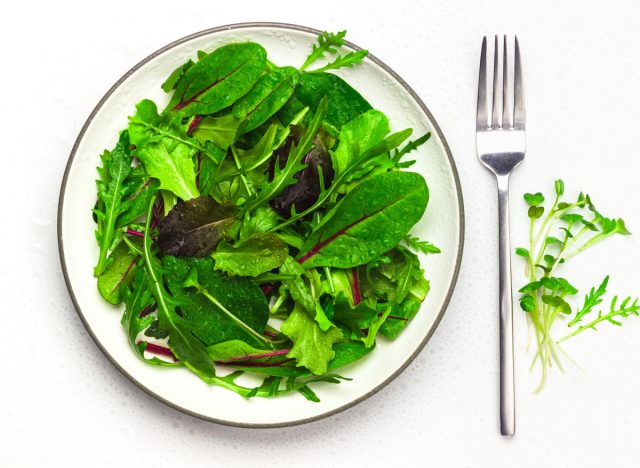
The fat you most want to attack through healthier eating habits is called visceral fat. This is the fat found deep within your abdomen, dangerously surrounding critical organs like the liver and pancreas. Research shows that visceral fat secretes biochemicals that may cause metabolic syndrome, cardiovascular disease, and certain cancers. But you can find a visceral fat-burning foe in the crisper drawer of your refrigerator: dark leafy greens like spinach, kale, arugula, and collards.
A study in the Journal of the Academy of Nutrition and Dietetics suggests that eating lots of non-starchy, dark-colored vegetables like these greens is associated with decreased visceral abdominal fat as well as fat inside the liver. These dark leafy greens are superfoods because they’re low in calories—just about 10 to 15 calories per cup—and contain many nutrients like vitamin K, magnesium, folate, calcium, vitamin C, and mostly insoluble fiber, says Eatthis.com medical review board member and registered dietitian Lisa Moskovitz, RD, CDN, the CEO of The NY Nutrition Group.
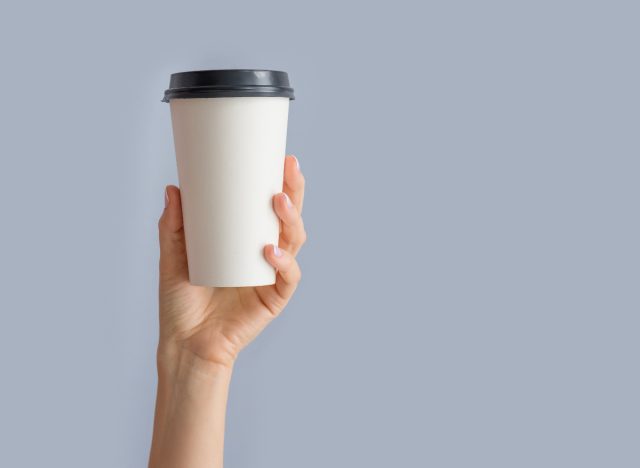
Caffeine is a stimulant that’s well-known for elevating alertness, cognitive function, and metabolism, the latter possibly helping with weight loss. You’ve no doubt felt the jittery burst of energy after downing an espresso. That’s your heart rate and metabolism revved up.
Now, a small study in a 2021 issue of the Journal of the International Society of Sports Nutrition suggests that a caffeine booster increases fat burn when paired with exercise. When researchers gave male participants caffeine equal to the amount in a strong cup of coffee 30 minutes prior to a morning and evening workout, men who consumed the caffeine experienced a significant “increase in whole-body fat oxidation rate” compared to taking a placebo. Note: skip the sugar and creamers, which add more calories than you’ll burn.
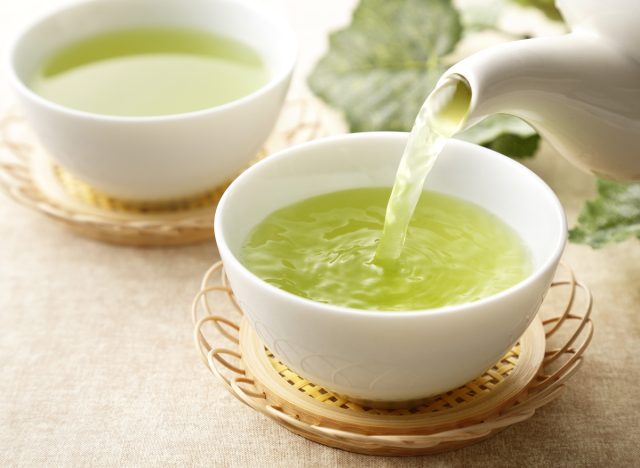
Many teas contain caffeine, but one type boasts a particularly powerful fat burner called epigallocatechin gallate, or EGCG for short. Found in abundance in green tea, this catechin has been shown in studies to help you burn more calories even at rest, resulting in weight loss, says Eathis.com medical review board member and registered dietitian nutritionist Lauren Manaker, MS, RDN. Research in the Journal of Nutrition demonstrated that obese adults who drank a caffeinated beverage containing green tea catechins burned more abdominal fat during exercise than obese adults who drank a placebo containing caffeine, but no green tea extract.
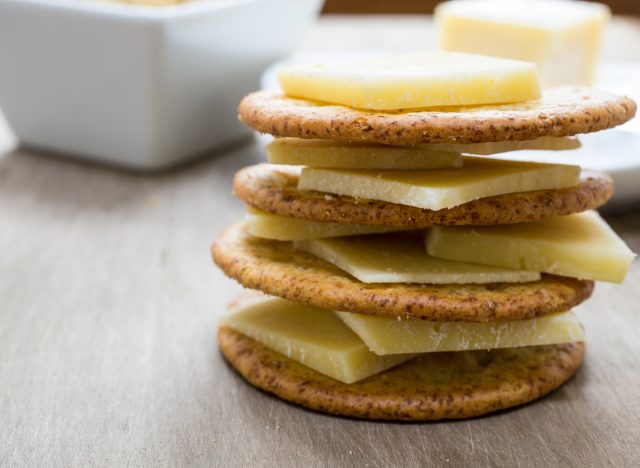
Here’s a tip that can help you crush hunger pangs while building muscle: When you eat carbohydrates, make a habit of combining them with a source of protein, suggests registered dietitian Amy Goodson, MS, RD, CSSD, an Eathis.com medical review board member. Protein digests more slowly, so you’ll feel full longer after the meal, which may translate into fewer calories eaten overall. In addition, protein (eggs, nuts, jerky, fish, beans, legumes, and dairy products) keeps the carbohydrates you’re eating from turning quickly into glucose that speeds through your bloodstream, raising your blood sugar.
“If you eat carbohydrates by themselves, they can spike your blood sugar, causing it to drop later and set you up for an energy crash,” says Goodson. The other reason you want to eat protein with every meal is that it’s the building block of muscle growth, and muscle is more metabolically active than fat, allowing your body to burn more calories even when you’re at rest.
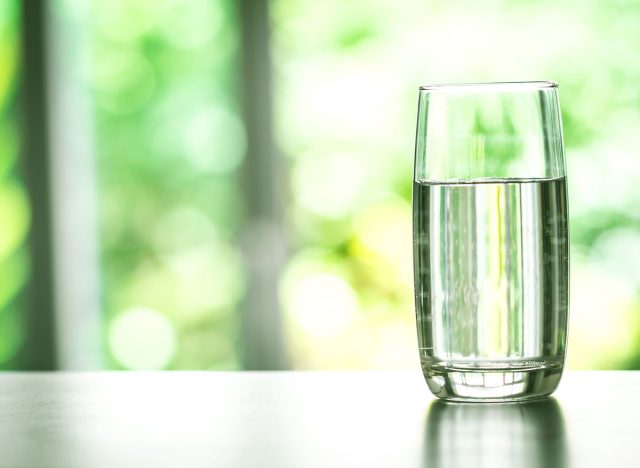
This is a good habit for boosting fat burn for a number of reasons. First of all, water is critical if you want your organs to function optimally. Secondly, staying well-hydrated can help you consume fewer calories. A glass of water before a meal fills your stomach just as a soup appetizer would, helping to satisfy hunger but without the calories. And often we are fooled by hunger pangs.
“Sometimes thirst can appear as hunger,” says Eatthis.com medical review board advisor Toby Amidor, MS, RD, a registered dietitian and best-selling author of Diabetes Create Your Plate Meal Prep Cookbook. “Sipping on water throughout the day can help keep you hydrated and may help keep hunger and cravings at bay.”
Even the act of bringing water into your body can increase metabolism. In a study in the Journal of Clinical Endocrinology and Metabolism, researchers found that 60 minutes after both male and female participants drank about 2 cups of water, they increased energy expenditure by 30%.
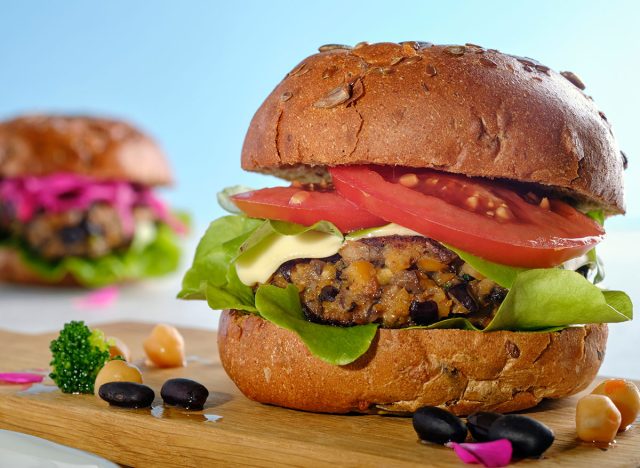
Eating more vegetables and less meat is a great habit for health as well as weight loss. But that doesn’t mean you have to go all-out vegan to reap the benefits. Get in the habit of making one dinner each week meatless, and focus on plant-based protein. A University of Copenhagen study found plant-based proteins to be even more hunger satisfying than pork- and veal-based meals and make people feel fuller. What’s more, the researchers also discovered that participants who ate a high-protein vegetarian meal consumed 12 percent fewer calories in their next meal compared to those who ate meat.
Jeff Csatari
editing Galvanized Media books and magazines and for advising journalism
students through the Zinczenko New Media Center at Moravian University in Bethlehem, PA. Read more about Jeff

